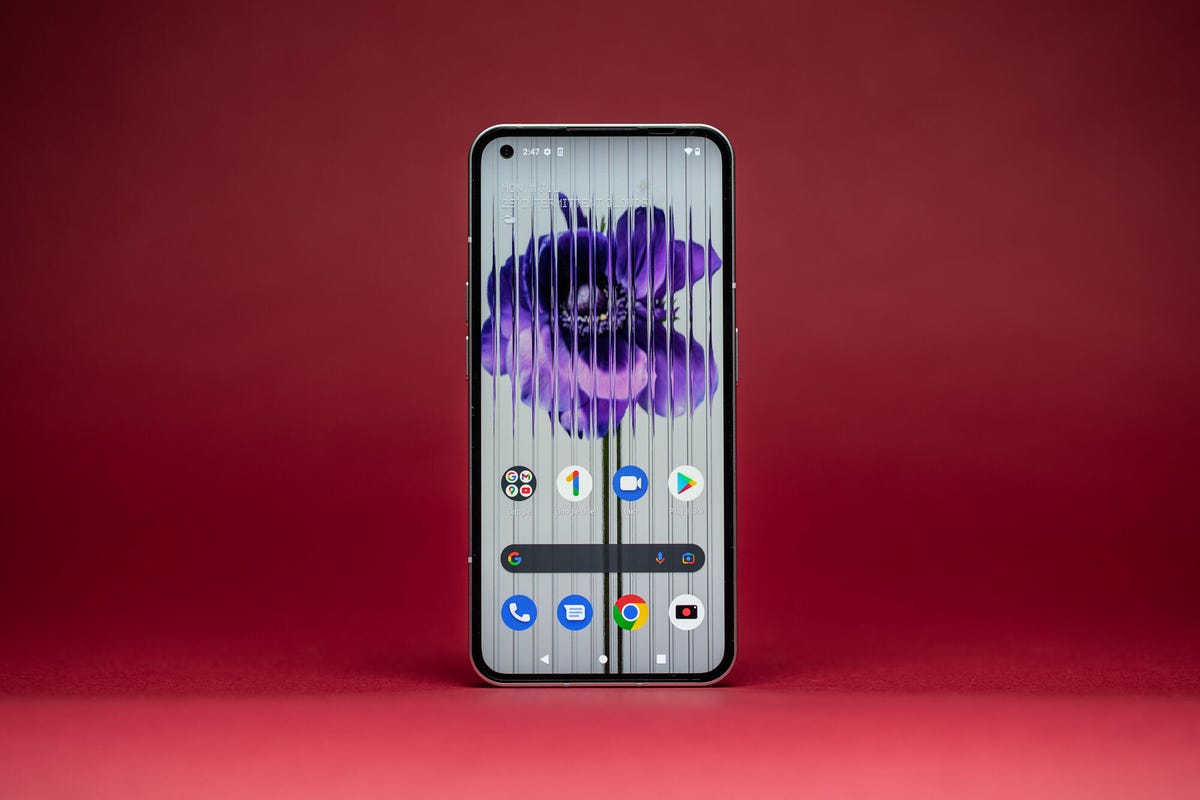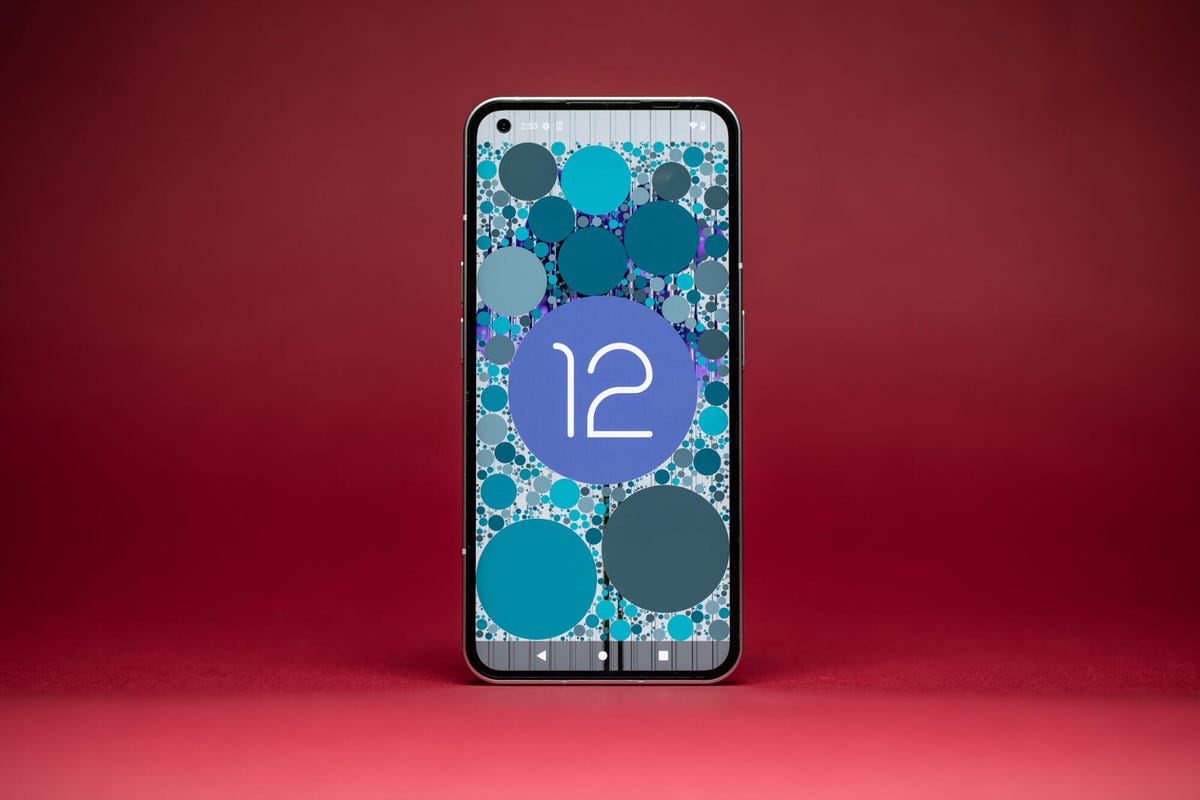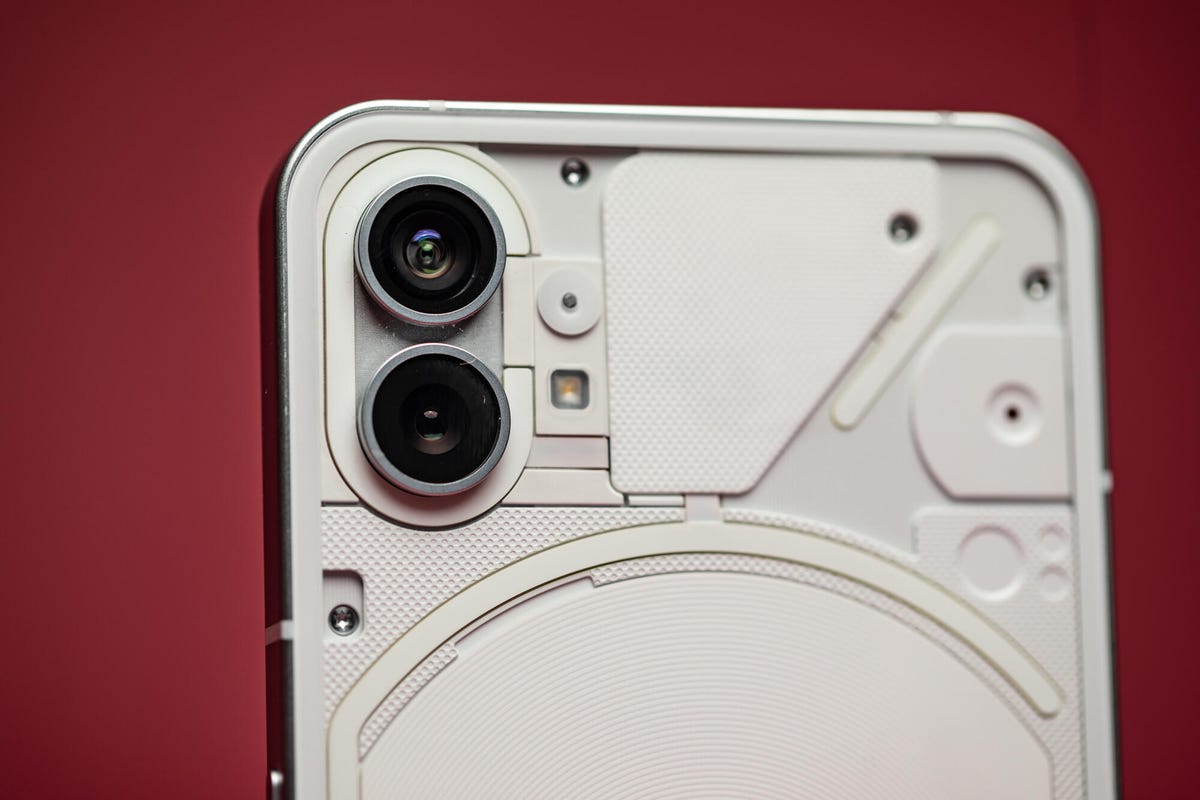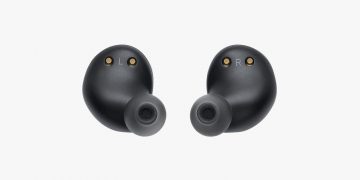The Nothing Phone 1 — the company’s first phone — is one that I’ve been keen to get my hands on for a while. Now that I’ve spent some time with it, that excitement hasn’t faded. It’s a 5G phone that gets a lot of things right, from its stripped-back interface to its generally solid performance and, most of all, its quirky transparent design with unique flashing LEDs on the back.
But it’s the price that makes this phone so appealing. Starting at only £399 in the UK (which converts to roughly $480 or AU$700), the Nothing Phone 1 is at least £100 less than I expected it to be. It’s a low price, but what you get is a phone that feels like a premium product.
That is, if you can buy one. While the phone is on sale now in the UK and Europe, there are currently no plans for a full launch in the US. Nothing said that it’s “definitely aiming to launch a US-supported mobile in the future,” but it seems unlikely to happen any time soon. It may be that people in the US miss out on this first-gen model altogether.
Like
- Affordable price
- Unique, flashy design
- Solid processor and camera performance
Don’t Like
- Battery life could be better
- For some, the back lights might be a gimmick
Should you buy the Nothing Phone 1?
The Nothing Phone 1 certainly isn’t an iPhone 13 Pro or Galaxy S22 Ultra rival. But it’s not trying to be. It’s a good phone, not because it tries to cram in every feature you could possibly imagine, but because it leaves them out. Both its hardware and software are stripped back, leaving you with a phone that’s well suited for everyday needs at a price that’ll still leave some cash in your bank.
It’s rare that a new company arrives on the scene with a first product that feels this polished, but the Nothing Phone 1 manages to get all the essentials right, while adding in the extra pizzazz of that flashy design. If you’re after a well-performing phone for a good price, it’s definitely worth considering.
Watch this:
Nothing Phone 1 Is a Superb, Affordable Phone
7:53
A flashy design, a big display
The Phone 1’s design is certainly the thing that sets it apart from the competition. The back panel is entirely transparent, letting you see the interconnected components beneath including the wireless charging coil and multiple exposed screwheads. The only Nothing branding is a small logo in the bottom corner.
That transparency also allows for the lightshow; a set of LED strips, which Nothing calls the “glyph,” light up across the back panel to alert you to incoming calls or notifications or even to use as a fill light when recording video. It’s certainly unique and it’s nice to see some different ideas on phones, especially in the budget sector, which is often awash with forgettable gray or black slabs.

The Nothing Phone 1 houses its selfie camera in a cutout on the top-left corner of the screen.
Andrew Lanxon/CNET
But it’s also arguably something of a gimmick. Time will tell how useful it really is. You might just not like the design, which is fair enough, but at this price it’s fair to say you’re not just paying for its looks.
Around the edge is a recycled aluminum frame that gives the phone a satisfyingly sturdy feel, while its IP53 water-resistance rating will help keep it safe from spilled drinks.
The 6.55-inch display is big enough to do justice to Netflix shows on the move, as does its 2,400×1,080-pixel resolution and vibrant colors. Its 120Hz refresh rate means that swiping around the home screens or scrolling through webpages looks buttery smooth.
Good enough performance for the price
Powering the phone is a Qualcomm Snapdragon 778G Plus processor, backed up by 8GB of RAM. Results on benchmark tests for both processing power and graphics performance put it far away behind top models like the iPhone 13 Pro or S22 Ultra and slightly less behind more affordable handsets like the Pixel 6 or 6 Pro.

Nothing runs a rather clean version of Android 12 adding minor improvements throughout.
Andrew Lanxon/CNET
That should be expected for a more affordable device, and the reality is that it’s still got plenty of power for the majority of tasks you’d likely need it to do. Gaming in Asphalt 9: Legends and PUBG were handled perfectly, as was video streaming and image editing in Snapseed. Even just navigating around the interface was swift and nippy.
That’s likely helped by a stripped-back approach to the software. The phone runs Android 12, over which Nothing has slapped a minimal cosmetic skin. Overall, it’s a light touch and doesn’t include bloatware, preinstalled apps or services. Nothing hasn’t tried to pointlessly develop its own email client (it knows you’d rather use Gmail) or create its own web browser (because you’ll use Chrome, of course). In fact, all of the system apps are just the default Google ones.
This minimalist approach works well, making the phone feel clutter-free and usable. It’s an approach I like. For comparison, Samsung notoriously preloaded its phones for years with its own software and services, making its phones feel bogged down.

Behind the top layer of internal components is a 4,500-mAh battery.
Andrew Lanxon/CNET
Solid dual cameras
Nothing kept the camera setup stripped back too, equipping the phone with just two rear 50-megapixel cameras including a standard wide-angle lens and an ultrawide lens. Nothing has kept the cost down by omitting dedicated telephoto and macro cameras, which is a good decision.

Notice the way the Phone 1’s main camera captures the sky and clouds in this photo.
Andrew Lanxon/CNET

The colors are vibrant in this photo from the main camera.
Andrew Lanxon/CNET
The cameras take great photos. The main camera captures vibrant colors, with even exposure and plenty of detail. Side-by-side, shots from my iPhone 13 Pro are arguably better, but they’re certainly not twice as good. It’s worth remembering that the iPhone costs twice as much as the Nothing Phone 1.

Here is a shot of a river boat taken with the main camera.

Here’s the same riverboat in a photo from the ultrawide. There is some noticeable color shift.
Andrew Lanxon/CNET
The ultrawide camera does a solid job for snaps in good light, but there’s a noticeable shift in the color balance.

The 16-megapixel resolution of the selfie camera provides plenty of detail while the colors are rich and vibrant.
Andrew Lanxon/CNET
Nothing’s cameras are by no means the best ones around, but if that’s what you’re looking for you’ll need to spend more than twice the cash on the Galaxy S22 Ultra. For the money, the Phone 1’s cameras do a superb job and will suit you well if you want vibrant shots of your next family vacation.
OK battery life with fast charging
Providing the juice is a 4,500-mAh battery, which is capacious enough to keep you going for a full day as long as you’re fairly careful with what you do. In my tests, after an hour of streaming a YouTube video on Wi-Fi with the screen at maximum brightness, it had dropped from full to 93%, and further to 83% after a second hour.
That’s not a great performance — the OnePlus 10 Pro, Pixel 6 Pro, iPhone 13 Pro and Honor Magic 4 Pro all put in better efforts here. But it’s a demanding test, and with more cautious use you shouldn’t struggle to get a day out of it. If you’re not playing graphically intense games or streaming lots of videos, you should make it through a day. Though you’ll definitely need to charge it every night.
See the Nothing Phone 1’s Transparent Back, Flashing Glyph
See all photos
Getting it charged when you’re in a hurry shouldn’t be an issue. The Phone 1 supports 33-watt fast charging, which Nothing claims takes it from empty to 50% full in under 30 minutes. Unfortunately, a compatible fast charger doesn’t come in the box and is only available as an add-on accessory.
Nothing Phone 1 specs vs. Samsung Galaxy A53 5G, Google Pixel 6A, Apple iPhone SE (2022)
Nothing Phone 1
Samsung Galaxy A53 5G
Google Pixel 6A
Apple iPhone SE (2022)
Display size, resolution, refresh rate
6.55-inch OLED display, 2,400×1,080 pixels; 120Hz
6.5-inch AMOLED, 2,400×1,080 pixels; 120Hz
6.1-inch OLED; 2,400×1,080 pixels; 60Hz
4.7-inch LCD; 1,334×750 pixels; 60Hz
Pixel density
402ppi
405ppi
429 ppi
326ppi
Dimensions (Inches)
6.27 x 2.98 x 0.33 in
6.28 x 2.94 x 0.32 in
6.0 x 2.8 x 0.35 in
5.45 x 2.65 x 0.29 in
Dimensions (Millimeters)
159.2 x 75.8 x 8.3 mm
159.6 x 74.8 x 8.1 mm
152.2 x 7.18 x 8.9 mm
138.4 x 67.3 x 7.3 mm
Weight (Ounces, Grams)
193.5g
6.67 oz; 189g
6.3 oz; 178g
5.09 oz; 144g
Mobile software
Android 12
Android 12
Android 12
iOS 15
Camera
50-megapixel (main), 50-megapixel (ultrawide)
64-megapixel (wide), 12-megapixel (ultrawide), 5-megapixel (macro), 5-megapixel (depth)
12.2-megapixel (wide), 12-megapixel ultrawide)
12-megapixel (wide)
Front-facing camera
16-megapixel
32-megapixel
8-megapixel
7-megapixel
Video capture
4K
4K
4K
4K
Processor
Snapdragon 778G Plus
Exynos 1280
Google Tensor
Apple A15 Bionic
Storage
128GB, 256 GB
128GB
128GB
64GB, 128GB, 256GB
RAM
8GB, 12GB
6GB
6GB
NA
Expandable storage
None
Up to 1TB
None
None
Battery
4,500 mAh; 33W wired charging — fast charger not included, 15-watt wireless charging, 5-watt reverse charging
5,000 mAh; 25W wired charging — charger not included, does not support wireless charging
4,410 mAh; 18W fast charging — adapter sold separately, does not support wireless charging
Batttery size not disclosed; 20-watt wired charging — charger not included, 7.5W wireless charging
Fingerprint sensor
In-display
In-display
In-display
Home button
Connector
USB-C
USB-C
USB C
Lightning
Headphone jack
None
None
None
None
Special features
5G, IP53, 3 years of Android updates, dual SIM
5G; IP67 rating; Samsung Pay
5G, security updates for 5 years, Android OS updates for 3 years, dual SIM, IP67 water resistance
5G, water resistant (IP67), dual SIM
Price off-contract (USD)
UK price converts to $480 (128GB + 8GB RAM); $530 (256GB + 8GB RAM); $590 (256GB + 12GB RAM)
$450
$449
$399 (64GB), $449 (128GB), $549 (256GB)
Price (GBP)
£399 (128GB + 8GB RAM); £449 (256GB + 8GB RAM); £499 (256GB + 12GB RAM)
£399
£399
£419 (64GB), £469 (128GB), £569 (256GB)
Price (AUD)
UK price converts to AU$700 (128GB + 8GB RAM); AU$785 (256GB + 8GB RAM); AU$875 (256GB + 12GB RAM)
AU$699
A$749
AU$749 (64GB), AU$829 (128GB), AU$999 (256GB)
Source by www.cnet.com






























